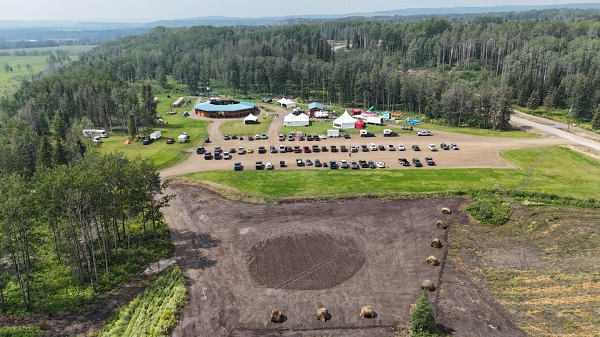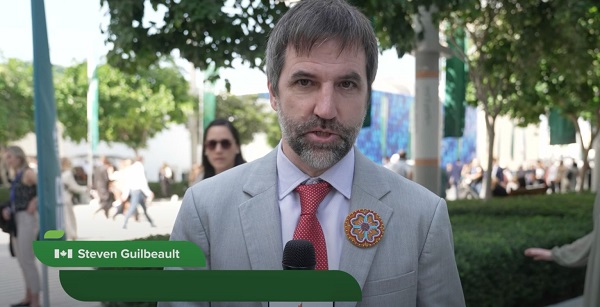Alberta
Open letter to Ottawa from Alberta strongly urging National Economic Corridor

Canada’s wealth is based on its success as a trading nation. Canada is blessed with immense resources spread across a vast country. It has succeeded as a small, open economy with an enviable standard of living that has been able to provide what the world needs.
Canada has been stuck in a situation where it cannot complete nation‑building projects like the Canadian Pacific Railway that was completed in 1885, or the Trans Canada Highway that was completed in the 1960s. With the uncertainty of U.S. tariffs looming over our country and province, Canada needs to take bold action to revitalize the productivity and competitiveness of its economy – going east to west and not always relying on north-south trade. There’s no better time than right now to politically de-risk these projects.
A lack of leadership from the federal government has led to the following:
- Inadequate federal funding for trade infrastructure.
- A lack of investment is stifling the infrastructure capacity we need to diversify our exports. This is despite federally commissioned reports like the 2022 report by the National Supply Chain Task Force indicating the investment need will be trillions over the next 50 years.
- Federal red tape, like the Impact Assessment Act.
- Burdensome regulation has added major costs and significant delays to projects, like the Roberts Bank Terminal 2 project, a proposed container facility at Vancouver, which spent more than a decade under federal review.
- Opaque funding programs, like the National Trade Corridors Fund (NTCF).
- Which offers a pattern of unclear criteria for decisions and lack of response. This program has not funded any provincial highway projects in Alberta, despite the many applications put forward by the Government of Alberta. In fact, we’ve gone nearly 3 years without decisions on some project applications.
- Ineffective policies that limit economic activity.
- Measures that pit environmental and economic objectives in stark opposition to one another instead of seeking innovative win-win solutions hinder Canada’s overall productivity and investment climate. One example is the moratorium on shipping crude through northern B.C. waters, which effectively ended Enbridge’s Northern Gateway proposal and has limited Alberta’s ability to ship its oil to Asian markets.
In a federal leadership vacuum, Alberta has worked to advance economic corridors across Canada. In April 2023, Alberta, Saskatchewan and Manitoba signed an agreement to collaborate on joint infrastructure networks meant to boost trade and economic growth across the Prairies. Alberta also signed a similar economic corridor agreement with the Northwest Territories in July 2024. Additionally, Alberta would like to see an agreement among all 7 western provinces and territories, and eventually the entire country, to collaborate on economic corridors.
Through our collaboration with neighbouring jurisdictions, we will spur the development of economic corridors by reducing regulatory delays and attracting investment. We recognize the importance of working with Indigenous communities on the development of major infrastructure projects, which will be key to our success in these endeavours.
However, provinces and territories cannot do this alone. The federal government must play its part to advance our country’s economic corridors that we need from coast to coast to coast to support our economic future. It is time for immediate action.
Alberta recommends the federal government take the following steps to strengthen Canada’s economic corridors and supply chains by:
- Creating an Economic Corridor Agency to identify and maintain economic corridors across provincial boundaries, with meaningful consultation with both Indigenous groups and industry.
- Increasing federal funding for trade-enabling infrastructure, such as roads, rail, ports, in-land ports, airports and more.
- Streamlining regulations regarding trade-related infrastructure and interprovincial trade, especially within economic corridors. This would include repealing or amending the Impact Assessment Act and other legislation to remove the uncertainty and ensure regulatory provisions are proportionate to the specific risk of the project.
- Adjusting the policy levers that that support productivity and competitiveness. This would include revisiting how the federal government supports airports, especially in the less-populated regions of Canada.
To move forward expeditiously on the items above, I propose the establishment of a federal/provincial/territorial working group. This working group would be tasked with creating a common position on addressing the economic threats facing Canada, and the need for mitigating trade and trade-enabling infrastructure. The group should identify appropriate governance to ensure these items are presented in a timely fashion by relative priority and urgency.
Alberta will continue to be proactive and tackle trade issues within its own jurisdiction. From collaborative memorandums of understanding with the Prairies and the North, to reducing interprovincial trade barriers, to fostering innovative partnerships with Indigenous groups, Alberta is working within its jurisdiction, much like its provincial and territorial colleagues.
We ask the federal government to join us in a new approach to infrastructure development that ensures Canada is productive and competitive for generations to come and generates the wealth that ensures our quality of life is second to none.
-
Devin Dreeshen
Devin Dreeshen was sworn in as Minister of Transportation and Economic Corridors on October 24, 2022.
Alberta
Halfway River First Nation makes history with Montney natural gas development deal

In northeast B.C., about 75 kilometres from Fort St. John, Halfway River First Nation sits in the heart of the Montney, one of North America’s largest natural gas plays. Photo courtesy Halfway River First Nation
From the Canadian Energy Centre
By Will Gibson
Greg Kist has seen plenty of change during more than three decades working in the energy industry. But the former executive with Petronas and Progress Energy has rarely experienced a history-making moment.
That happened in July 2024, when the B.C. government awarded the Halfway River First Nation what’s known as oil and gas tenure in the heart of the Montney play.
It’s an agreement that grants the Nation decision-making authority over the exploration and development of petroleum and natural gas resources on more than 34,000 hectares of Crown land in its traditional territory, located approximately 1,000 kilometres northeast of downtown Vancouver.
That agreement is now moving further into action with a deal between Halfway River-owned Tsaa Dunne Za Energy (TDZE) and ARC Resources.

Members of the Halfway River First Nation participate in a field tour with the BC Energy Regulator in June 2025. Photo courtesy BCER
The agreement, signed earlier this year, will see TDZE work with Calgary-based ARC to develop about 25 per cent of the tenured land.
The region is adjacent to ARC’s existing Attachie natural gas operations, which are rich in high-value natural gas liquids.
The company describes Attachie as one of its most profitable assets, which can be expanded thanks to the TDZE agreement.
“This land was deferred from development for more than two decades while sitting in the premier natural gas play in North America,” says Kist, one of TDZE’s managing executives.
“Unlocking it will generate all kinds of economic activity and royalties for the B.C. government that help pay for schools and health care. But it will also generate the same benefits for the Halfway River First Nation.”
ARC plans to integrate the new areas using existing roads, pipelines and other infrastructure from Attachie.
Developing the land will still require consultation with the Halfway River First Nation.

Drilling in the Montney play straddles the border between northeast B.C. and northwest Alberta. Photo courtesy ARC Resources
“This is very much about Tsaa Dunne Za Energy delivering the best return on this particular asset for its shareholders, which are the members of the Halfway River First Nation,” Kist says.
In addition to granting tenure to develop oil and gas on the land, the B.C. government and Halfway River have implemented a landscape planning pilot to mitigate the impacts of development on the Nation’s Treaty 8 rights and manage potential cumulative effects of new development.
“The tenure award and landscape planning pilot will help to ensure that oil and gas development in these areas is sustainable and managed in accordance with the values of the Halfway River First Nation,” Chief Darlene Hunter said in a statement.
Kist sees the agreement as a template for other governments, energy companies and First Nations to follow.
“This has the potential to be the model for cooperative development so that we can develop resources in the right way that benefits governments, First Nations and industry. I’m proud to be a part of this because everybody involved wins from this.”
Alberta
Alberta Takes The Lead: With no company willing to spearhead a new pipeline under federal restrictions, Danielle Smith grabs the reins

Alberta leads as proponent for West Coast pipeline
Alberta’s government, acting as proponent, will lead a technical advisory group of companies with Indigenous participants to advance a West Coast pipeline application.
With the advice and technical support of three major pipeline companies, Alberta’s government, acting as proponent, will develop and submit a formal application for a project of national significance to the Federal Major Projects Office under the Building Canada Act. Indigenous communities in Alberta and British Columbia are being engaged from Day 1. Indigenous co-ownership, partnership and perspectives will be critical to every stage of project development and execution.
The advisory group will undertake the early planning, technical assessment and application for an oil pipeline proposal to the northwest coast of British Columbia. When completed, the project will significantly increase market access to responsibly and ethically produced Canadian crude oil products.
“This project application is about more than a pipeline; it’s about unlocking Canada’s full economic potential. By doing this the right way from Day 1 with Indigenous partners and industry expertise, we will deliver a proposal that proves this project is undeniably in the national interest. Together, we are charting a path to secure Canada’s energy future for generations while bringing the world’s most ethically and responsibly produced energy to market.”
The goal of this planning and pre-front end engineering and design work is to determine the general path and size of the pipeline, quantify costs, initiate early Indigenous engagement and partnership, and make the clear case that this pipeline is in the national interest. Alberta’s government will contribute $14 million to support early planning work including cost estimates, engagement and development of a credible proposal for federal consideration.
“We already see Canada as an energy powerhouse, and with the right infrastructure, moving toward superpower status is both realistic and achievable. Increased market access from Alberta to tidewater will scale Canada’s export markets and diversification, while supporting the federal government’s newly stated ambition of becoming an energy superpower.”
Indigenous leadership and perspectives are essential to guiding major projects like this that will grow our economy, safeguard the environment and create lasting opportunities for Indigenous partners. Our engagement strategy will reflect the diversity of Indigenous governance structures and be tailored to reflect each community’s unique context. By bringing together innovation and technology with Indigenous perspectives and cultures, we are creating the conditions for meaningful dialogue and the right mix of expertise to shape a project that reflects shared values and priorities.
“This is about partnerships and building trust from Day 1 – ensuring Indigenous voices shape the decisions that affect their lands and futures. Alberta’s government is committed to respectful, transparent engagement that recognizes Indigenous communities as rights holders, leaders and owners in the prosperity we build together.”
“Fort McKay First Nation welcomes the opportunity to be engaged from the very beginning of this important project. True partnership means listening to Indigenous voices, respecting our lands and ensuring our people share in the benefits. By working together with government and industry, we can create opportunities that strengthen our communities, while showcasing the incredible potential of Alberta’s energy sector.”
“The National Coalition of Chiefs has always said that oil and gas participation, including ownership opportunities, can be a way to drive economic reconciliation. We are happy that Alberta is leading an effort to get another pipeline to the West Coast, and we are especially happy that they have decided to engage with Indigenous nations in B.C. and Alberta right from the very beginning of the process.”
The technical advisory group will include multiple industry participants, bringing expertise in engineering, construction, Indigenous relations and market demand. The groups efforts will be supervised by a panel that currently includes:
- Larry Kaumeyer, deputy minister, Energy and Minerals (co-chair)
- Alex Pourbaix, executive chair, Cenovus (co-chair)
- Rajan Sawhney, Minister of Indigenous Relations
- Hal Kvisle, energy industry executive
- Roderick Graham, board director, AER
- Chief Jim Boucher, chair, president and co-founder, Saa Dene Group of Companies
- Al Monaco, former president and chief executive officer at Enbridge
- Corey Bieber, board director, Vermilion Energy
- Chris Sankey, principal owner and president, Blackfish Enterprises
- Dave Lamouche, president, Metis Settlements General Council
The project of national significance application process will explore all opportunities to deliver Alberta’s responsibly produced energy resources to market, while carefully assessing all aspects required to advance a northwest coastal crude oil pipeline.
Quick facts
- The expected application submission to the Federal Major Projects Office is approximately spring of 2026.
- The three companies participating in the technical advisory group are South Bow, Enbridge and Trans Mountain.
- Canada has the fourth-largest proven oil reserves globally and is the fourth-largest global oil producer.
- Net export receipts of crude oil have climbed from $6 billion in 2000 to $130 billion in 2024.
- Additional infrastructure from Alberta’s oilsands to B.C.’s coast will ensure Alberta energy resources can contribute to meeting significant Asian demand from countries like Japan, Korea, China and India.
-

 Business2 days ago
Business2 days agoDominic Barton’s Shadow Over $1-Billion PRC Ferry Deal: An Investigative Op-Ed
-

 Alberta2 days ago
Alberta2 days agoAlberta refuses to take part in Canadian government’s gun buyback program
-

 Censorship Industrial Complex2 days ago
Censorship Industrial Complex2 days agoCanada To Revive Online Censorship Targeting “Harmful” Content, “Hate” Speech, and Deepfakes
-

 Alberta2 days ago
Alberta2 days agoOrthodox church burns to the ground in another suspected arson in Alberta
-

 Fraser Institute1 day ago
Fraser Institute1 day agoAboriginal rights now more constitutionally powerful than any Charter right
-

 Business1 day ago
Business1 day agoNew PBO report underscores need for serious fiscal reform in Ottawa
-

 Alberta1 day ago
Alberta1 day ago$150 a week from the Province to help families with students 12 and under if teachers go on strike next week
-

 Agriculture1 day ago
Agriculture1 day agoCarney’s nation-building plan forgets food







